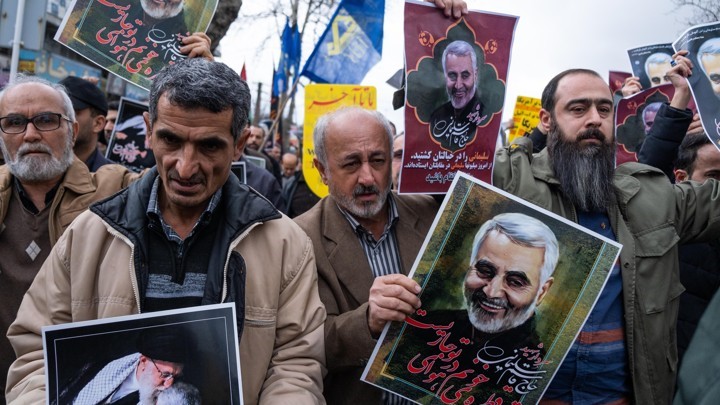
By Danny R. Johnson/Political News Editor
WASHINGTON — There was a case for killing Major General Qassem Soleimani. For two decades, as the commander of the Revolutionary Guards’ Quds Force, he executed Iran’s long game of strategic depth in the Middle East—arming and guiding proxy militias in Lebanon and Iraq that became stronger than either state, giving Bashar al-Assad essential support to win the Syrian civil war at the cost of half a million lives, waging a proxy war in Yemen against the hated Saudis, and repeatedly testing America and its allies with military actions around the region for which Iran never seemed to pay a military price.
The United States, a vastly stronger power, was unwilling to strike back in a way that would risk a war it didn’t want. Whenever Soleimani came within American gun sights, the U.S. declined to pull the trigger. Perhaps he acquired a sense of impunity. Iran—a midsize country with an unintimidating conventional army, a vulnerable economy, and a chronically restless population—seemed to have the winning hand, all because the U.S. wouldn’t use its overwhelming military advantage.
The Obama administration negotiated a historic agreement that contained Iran’s nuclear ambitions, but not its proxy wars. Those were supposed to be the subject of subsequent talks. But it was never obvious why Iran would abandon the one tool of power it had learned to use so successfully. Deprived of a nuclear arsenal, Iran had to rely more than ever on its Quds Force and its array of regional allies. Without saying so, President Barack Obama was prepared to accept this state of affairs if the only real alternative was another Middle Eastern war.
President Donald Trump, contemptuous of his predecessor’s every policy, replaced diplomacy with “maximum pressure,” tore up the nuclear deal (with which Iran had been in compliance), and imposed suffocating economic sanctions. The idea was to force a weakened Iran back to the table and enter into a new agreement that would truly contain the Islamic Republic—no more regional wars along with no Iranian nukes. Some American hawks imagined that maximum pressure would lead to a permanent solution for the Iran problem: regime change.
All this, too, was a fantasy. When sanctions choked off Iran’s lifeblood and crushed its people, the Islamic Republic reacted predictably—by lashing out at oil tankers and foreign military vessels in the Persian Gulf, at an oil facility in Saudi Arabia, and then at American forces in Iraq. This last action created the spiral of escalation that led last night to the death of Soleimani along with several Iraqi leaders of Iran-backed militias. That these men were riding together in a single vehicle near the Baghdad airport shows that Iran is just as liable as the U.S. to overplaying its hand in Iraq.
A lot of commentary has focused on whether Soleimani deserved to be killed. Trump’s supporters call him a monster and pound their chests in righteous triumph, as if the purpose of the strike was to show our power and produce a moment of visceral satisfaction at seeing dead this man who’d mocked American resolve for years. Trump’s critics point to all the destruction caused by the American war in Iraq, as if that disaster should require impotence of us rather than simply wisdom and restraint.
Killing Soleimani Resolves Nothing
But the main question about the strike isn’t moral or even legal—it’s strategic. Soleimani was a supremely powerful leader of a state apparatus, with his own cult of personality, but he was not a terror kingpin. His death doesn’t decapitate anything. He had the blood of tens of thousands of people—overwhelmingly fellow Muslims—on his hands, but he was only the agent of a government policy that preceded him and will continue without him. His deeds are beside the point; so is the display of American resolve. The only reason to kill Soleimani is to enter a new war that the United States can win.
What would that war look like? How will Iran fight it? How will the U.S. respond? What credible allies will we have, after Trump’s trashing of the nuclear deal thoroughly alienated Europe? Who will believe any intelligence about Iran’s actions and intentions from an administration that can’t function without telling lies? How will American officials deliberate when Trump has gotten rid of his experts and turned his government into a tool of personal power? What is the point of having a Congress if it has no say about a new American war? What is our war aim, and how can it be aligned with Trump’s obvious desire to be rid of any entanglement in the region? What will happen if Jerusalem becomes a target and Israel enters the conflict? What will the American people accept by way of sacrifice, when nothing has prepared them for this?
There’s no sign that anyone in power, least of all the president, has even asked these questions, let alone knows how to answer them. No one seems to have thought past the action itself. The initial statements from the administration have been alarmingly ludicrous. “This strike was aimed at deterring future Iranian attack plans,” the Defense Department announced afterward. “The world is a much safer place today,” Secretary of State Mike Pompeo intoned, sounding like the Minister of Truth. “I can assure you that Americans in the region are much safer.”
Only ignoramuses and ideologues claim to know what’s going to happen next, but one prediction I’m willing to make is that events will shortly obliterate these official statements. The strike had nothing to do with deterrence. Pompeo’s own department is warning Americans in Iraq: “U.S. citizens should depart via airline while possible, and failing that, to other countries via land. Due to Iranian-backed militia attacks at the U.S. Embassy compound, all public consular operations are suspended until further notice. U.S. citizens should not approach the Embassy.”
Killing Soleimani will only lead to more violence, perhaps much more. The victims will likely include Americans in the region and vulnerable civilians in Iran, including those who long for a better life than their rulers will allow them but have had to unite with their hard-line tormentors against a foreign aggressor. Neither Iran nor the United States knows how to read the other’s intentions—each is prone to underestimation—leaving the two countries to lash out in the dark.
A crisis acts like a barium test—it reveals the nature and health of a system. The Soleimani crisis shows a rash and vain president for whom everything is personal; a government that follows no coherent strategy because its leadership can’t provide one; and a Congress and public too irreconcilably divided to rally around a national goal. In this condition, we don’t know how to think about a war with Iran, let alone win one, and it’s not at all clear why we should try. For this reason, killing Soleimani was a blunder—briefly satisfying, possibly catastrophic.




